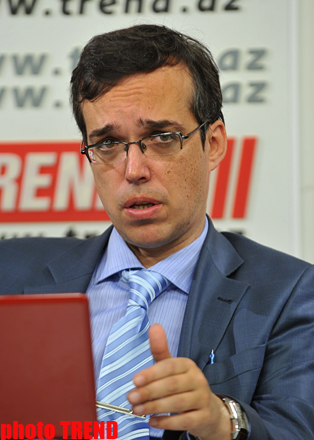Azerbaijan, Baku, Nov. 30 / Trend E. Tariverdiyeva /
It is not a coincidence that the WikiLeaks documents focused on the South Caucasian topics on the eve of the OSCE summit, Alexei Vlasov, editor-in-chief of analytical information portal Vestnik Kavkaza (Bulletin of the Caucasus), said.
"One failed to press on Azerbaijan. But it is possible to create unnecessary problems while discussing the fundamental document on the Nagorno-Karabakh settlement. Perhaps, it is correct to react in accordance with the proverb about the caravan and a dog. The humanity has not invented other recipes in this particular case yet," he said in an interview with Trend.
A quarter of a million of secret diplomatic telegrams and letters from U.S. diplomatic missions situated in various countries to the U.S. State Department were given by WikiLeaks website to New York Times and several other influential U.S and European media outlets.
The documents marked as "secret" supposedly disclose details of the correspondence of President Obama's administration on crisis and conflict. However, the greatest impact caused harsh statements of U.S. diplomats about presidents of Muslim countries, European leaders, snatches of information from supposedly private conversations between the leaders of countries and U.S. officials and demands of Clinton to organize surveillance over the members of the Security Council from Russia, China, France and Great Britain. The most world leaders have some doubt in authenticity of the documents.
The OSCE summit will be held in Astana on Dec. 1-2 and bring together the presidents and prime ministers of 56 OSCE member countries and 12 OSCE partner countries, as well as the heads of 68 international organizations. It is planned to discuss the Nagorno-Karabakh conflict during the meeting of Azerbaijani and Armenian Presidents Ilham Aliyev and Serzh Sargsyan within the summit.
The conflict between the two South Caucasus countries began in 1988 when Armenia made territorial claims against Azerbaijan. Armenian armed forces have occupied 20 percent of Azerbaijan since 1992, including the Nagorno-Karabakh region and seven surrounding districts.
Azerbaijan and Armenia signed a ceasefire agreement in 1994. The co-chairs of the OSCE Minsk Group - Russia, France, and the United States- are currently holding the peace negotiations.
Armenia has not yet implemented the U.N. Security Council's four resolutions on the liberation of Nagorno Karabakh and the surrounding regions.
According to Vlasov, the matter is not the latest technology, which was used by the creators of WikiLeaks, but simply the human weaknesses, through which they are trying to embroil allies, and sow discord between those who would seem to find common ground.
It is noteworthy that a significant part of published papers deals with the topic of the South Caucasus and the Caspian Sea, and from the South Caucasus countries, sample was made on the basis of Azerbaijani theme that "it seems to me that it is not at all accidental," said the analyst.
"Especially under the conditions of the incipient rapprochement between Moscow and Baku, and more intensive dialogue between Ankara and Baku. For some, this triangle is a very serious threat. And somehow I think that U.S. diplomacy does not really worry about the leakage of confidential documents, since now there is a great opportunity to throw 90 percent lie over 10 percent truth," said Vlasov.
Therefore, he said, the reaction shown by the Azerbaijani side is absolutely justified and in many respects is similar to the initial response by the press service of Dmitry Medvedev.
"In place of world leaders, I would have agreed, though such a task is almost impossible, but still, either we perceive these actions as an action of information terrorism, or with rapture begin to delve into the "dirty laundry", said the analyst.
It is not about freedom of speech or lack thereof, Vlasov said. It is impossible to allow a group of persons to hold the global elite in limbo, he said.
"Otherwise," the story of Dr. "Evil" or the plot of any other movies about the world villains may seem to like a baby talk," said the expert.
Materials of WikiLeaks prove once again that the key factor in relations between world leaders is the psychological environment, on backdrop of which complex combinations unfold in a big geopolitical game, the expert said.






